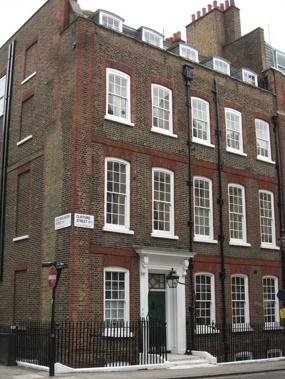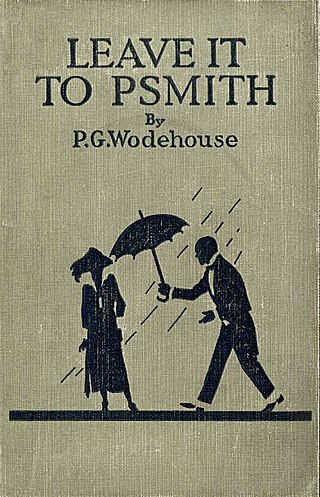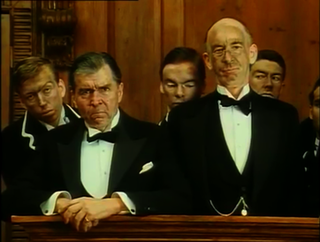Plot summary
In London, Pongo Twistleton is having money troubles, and his wealthy friend Horace Pendlebury-Davenport is in trouble with his fiancée, Pongo's sister Valerie, for hiring Claude "Mustard" Pott to trail her during the Drones Club weekend at Le Touquet. Horace having refused to loan him money, Pongo resolves to call on his Uncle Fred, 5th Earl of Ickenham, for assistance. Meanwhile, at Blandings, Horace's uncle Alaric, Duke of Dunstable, as well as demanding eggs to throw at anyone whistling "The Bonnie Banks o' Loch Lomond", has taken it into his head that Lord Emsworth's prized pig, the Empress of Blandings, needs some fitness training. In the absence of his trusty brother Galahad, Emsworth calls on Gally's old friend Ickenham for assistance in stopping the Duke from stealing the pig.
Horace, having fallen out with his cousin Ricky Gilpin over Gilpin's fiancée Polly Pott, daughter of Mustard, inadvertently makes trouble for Pongo by being dressed as a Zulu rather than a Boy Scout during a round of the "Clothes Stakes", run by Pott at the Drones. Pongo's mistaken bet loses all his money, adding to his already large debt. Uncle Fred ponders how to get Polly into Blandings to court her prospective uncle-in-law; Fred thinks the Duke will like her and ignore her background if they meet in a neutral situation. Emsworth creates an opening by insulting Sir Roderick Glossop by calling him a name from their school days, Pimples; Glossop then refuses to come to Blandings to analyse the increasingly loopy Duke of Dunstable, as Emsworth's sister Lady Constance has requested.
Fred heads to Blandings posing as Glossop, with Pongo playing the role of his secretary and nephew, and Polly his daughter Gwendoline. They unexpectedly meet Glossop on the train, who had later been persuaded by Constance to come despite the insult. Fred tells Glossop the Duke is on the train and Glossop can save time by talking with him, and then heading back to London. Fred is not aware that the stranger is Rupert Baxter, now working for the Duke. Arriving at Blandings, they are met by Lord Bosham, who was conned out of his wallet by Uncle Fred the previous day.
Baxter is sacked by the Duke because he was seen at a ball in London by Horace, but is taken on again when Fred, as Glossop, persuades Horace and the Duke that Horace is suffering delusions. Horace heads off for a rest-cure, and Baxter is left unable to reveal that he has seen through Fred's disguise, having met the real Glossop before. Baxter is put on his guard, and informs Constance; she in turn wants to hire a detective to deal with these imposters. Bosham remembers Mustard Pott, and calls him to Blandings.
Dunstable's scheme to acquire the pig continues apace, and he calls in his strapping nephew to help, but when Gilpin asks for funds to buy an onion soup bar, thus enabling him to marry Polly, the two row and part. Dunstable ropes in Baxter instead. Uncle Fred, meeting Pott just after he has won £250 from Bosham at "Persian Monarchs", takes the money off him, insisting it will help Polly marry wealthy Horace. Pott, meeting Gilpin at The Emsworth Arms, tells him about Polly being engaged to Horace, and the enraged Gilpin chases a fearful Horace back to the Castle. Fred gives the money to Pongo to pass on to Polly for Gilpin's benefit, but Gilpin spurns her and Pongo uses the returned cash to pay off his debts.
When Fred reconciles Gilpin and Pongo, another £250 is required. Pott is persuaded to take it from Dunstable at "Persian Monarchs", but the wily peer wins himself £300. Both Fred and Pott try to get it back, but Dunstable has the pig, captured earlier by Baxter, hidden in his bathroom, and is keeping his room under lock and key. Having knocked out the vigilant Baxter with a Mickey Finn, Fred finally gains access to the room shortly after Pott has done the same, Pongo having lured Dunstable away with a rendition of "The Bonnie Banks". Fred is caught by a shotgun-bearing Bosham, just as Pott, having discovered the Empress in the bathroom, drinks a second Mickey destined for Dunstable. Bosham locks Fred in a cupboard.
Valerie arrives, reunited with Horace and hot for vengeance on the uncle that made him think himself insane, and confirms Fred's identity; Fred convinces all that Emsworth has become infatuated with Polly, and that he is there to put a stop to it. He takes Dunstable's roll of cash under the pretext of paying Polly off—insisting that his visit remain a secret from Lady Ickenham to maintain the family dignity—and heads back to London with not only the money for Gilpin's soup bar, but an extra fifty quid for himself to blow on a few joyous weeks in the city.
Style
According to Robert A. Hall Jr., the proportion of dialogue to narrative prose increased in Wodehouse's work over time, beginning in the 1920s, after he had started his intensive involvement with the theatre. In Wodehouse's 1904 novel The Gold Bat , the first six chapters (over 10,000 words) contain 42 percent dialogue and 58 percent narrative, whereas in Uncle Fred in the Springtime, which Hall considered representative of Wodehouse's mature humour, the first three chapters (also over 10,000 words) contain 67 percent dialogue and only 33 percent narrative. In Wodehouse's mature style, longer narrative passages usually set the stage for conversational exchanges, while shorter narrative passages often describe actions which, in a theatrical performance, would be directly visible to the audience. However, Wodehouse also uses these narrative passages to make more detailed humorous comments about the dialogue and characters than would be possible in a play when staged. [2]
Wodehouse generally uses conservative verbal inflection in his narrative prose and dialogue, but occasionally contrasts this with an informal verbal inflection in conversation, such as when Lord Bosham and Lady Constance discuss the Duke of Dunstable's accident in chapter 12:
"It's true, is it, that the old bird has bust a flipper?"
"He has wrenched his shoulder most painfully," assented Lady Constance, with a happier choice of phrase. [3]
Where there is a difference between British and American usage of syntax, Wodehouse often follows the British pattern. While American English uses the simple form of a verb in subjunctive clauses (after verbs referring to desire, necessity, and the like), British English uses the inflected form wherever it is available. For example, in chapter 7, Lord Ickenham says: "It is essential [...] that Polly goes to Blandings and there meets and fascinates Dunstable." In American usage, this would be It is essential that Polly go, meet, and fascinate. [4]
Commercial products, patent medicines, and other items often have comical names in Wodehouse's stories. For example, in imitation of the names of swords like Excalibur and Durendal, Lord Ickenham's great bath-sponge is called Joyeuse. [5]
Exaggerated synonyms are used in Wodehouse's stories to vary the dialogue in humorous ways, such as when a character speaks of squashing in with the domestic staff (chapter 8). [6]










